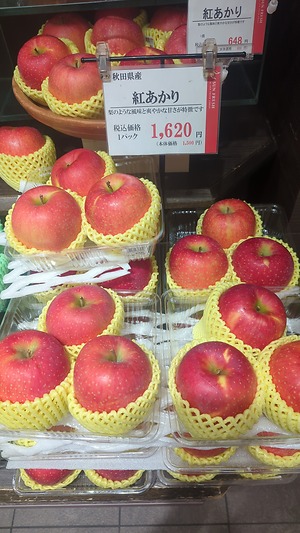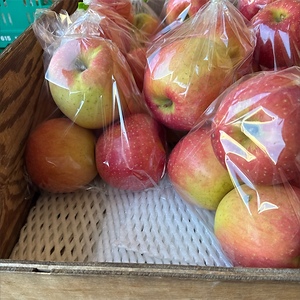


Beni Akari Apples
Estimated Inventory, lb : 0
Description/Taste
Akita Beni Akari apples are a medium to large varietal and have a conical, round, to oblong shape with broad, sloping shoulders tapering to a narrow base. The apples typically average around 340 grams in weight, and the fruit’s stem is short, slender, dark brown, woody, and fibrous. The apple’s skin is semi-thin, smooth, taut, and glossy, developing a waxy layer in storage. The apples also ripen from green to shades of yellow-green, covered in patches of bright red blush and striping. One distinct characteristic of the variety is the prominent yellow-green lenticels scattered across the surface. These lenticels have a raised nature, giving the skin a slightly textured, subtly rough feel. Underneath the surface, the white to ivory flesh is dense, moderately fine-grained, and aqueous with a crisp and crunchy consistency. The flesh also browns quickly and encases a central fibrous core filled with obovate black-brown seeds. Akita Beni Akari apples have a high sugar content, ranging from 13 to 15 degrees Brix, and are mixed with low acidity, creating a mild, sweet, and subtly tangy taste.
Seasons/Availability
Akita Beni Akari apples are harvested in the late fall through early winter, with a peak season from late October through early November. When properly stored, the apples can be sold through February.
Current Facts
Akita Beni Akari apples, botanically classified as Malus domestica, are a Japanese variety belonging to the Rosaceae family. The late-season apples are only grown in the Akita prefecture in Japan and are valued as a seasonal delicacy. Akita Beni Akari apples were chosen as a commercial cultivar in the early 21st century for their extended storage capabilities, crisp, juicy nature, and mild, sweet flavor. The apples tend to ripen simultaneously and are harvested from trees in a 1 to 3-day period. Akita Beni Akari apples are heavily promoted as one of the signature apples of the Akita Prefecture, and the fruits are grown in small quantities, making them rare in markets. The apples are customarily purchased for fresh and cooked preparations.
Nutritional Value
Akita Beni Akari apples are a source of vitamin C to strengthen the immune system, fiber to regulate the digestive tract, calcium to build strong bones and teeth, and potassium to balance fluid levels within the body. The apples also provide vitamin E to protect the cells against free radical damage, vitamin A to maintain healthy organ functioning, magnesium to control nerve functions, iron to produce the protein hemoglobin for oxygen transport through the bloodstream, copper to develop connective tissues, and other nutrients, including boron, zinc, and vitamin K. The apple's pigmented skin contains anthocyanins, natural compounds with antioxidant-like properties that protect the cells against free radical damage.
Applications
Akita Beni Akari apples have a mild, sweet, and subtly tangy taste suited for fresh or cooked preparations. The variety is typically consumed out of hand as a snacking apple to enjoy the crisp, juicy texture. Akita Beni Akari apples are also served with dips, displayed on appetizer platters, combined into fruit bowls, or tossed into salads. Try layering the apples into sandwiches for added crunch, or chop and top over crostini. Akita Beni Akari apples can also be blended into smoothies and shakes or pressed into juices for fruit beverages, cocktails, and punches. In addition to fresh preparations, Akita Beni Akari apples are sometimes added to parfaits, jellies, and custards or cooked into jams, jellies, marmalades, and preserves. The apples are also baked into crumbles, crisps, cakes, and muffins or cooked into sauces as a side dish to roasted meats. Akita Beni Akari apples pair well with spices such as cinnamon, cloves, nutmeg, and ginger, herbs including cilantro, mint, and parsley, and nuts such as almonds, pecans, and walnuts. Whole, unwashed Akita Beni Akari apples will keep for several weeks to months when wrapped in newspaper and stored in a cool, dry, and dark place such as a refrigerator’s crisper drawer or cellar.
Ethnic/Cultural Info
Akita Beni Akari apples were named for their speckled skin. It is said the yellow-green lenticels on the fruit’s surface look like tiny stars illuminating against the apple’s red skin. Beni translates to mean “red” in Japanese, and Akari means “brightness, brilliance, or light.” Combining the two words, Beni Akari is meant to be read as a bright or brilliant red light. The Akita Prefecture believes the apples are going to be the shining star of the prefecture’s apple industry and be a light in the commercial apple sector throughout Japan. The apple is also viewed as a symbol of hope for boosting the Akita Prefecture’s apple industry.
Geography/History
Akita Beni Akari apples are native to Japan and were developed in the Akita Prefecture in the late 20th century. The Akita Prefecture is located on the northwest side of Honshu Island, Japan’s main island, and is a region along the Sea of Japan with varying temperatures. In the winter, the prefecture is snowy and cold, and in the summer, the days are hot while the nights are cold, creating a temperature variation. This temperature variation contributes to Akita Beni Akari apple’s sweet taste. The apple variety was found as a chance seedling in 1996 in an orchard at the Fruit Tree Experiment Station, Akita Prefectural Agriculture, Forestry, and Fisheries Research Center. The variety was developed from a natural cross between Orin and Senshu apples and was selected in 1998 as a new possible cultivar. It took over fifteen years for the apples to be evaluated, studied, and trialed. Akita Beni Akari apples were submitted by the Akita Prefecture in 2002 as a new variety and were officially registered in 2005 under No. 12731. Akita Beni Akari apples are exclusively grown in the Akita Prefecture, and only growers within the prefecture can cultivate the fruits for the next 20 to 30 years. The variety is planted in the cities of Yuzawa, Kazuno, Odate, and Yokote in the Akita Prefecture and shipped to other prefectures throughout Japan for commercial sale. When in season, Akita Beni Akari apples are found directly through growers, farmer’s markets, and high-end department stores.










